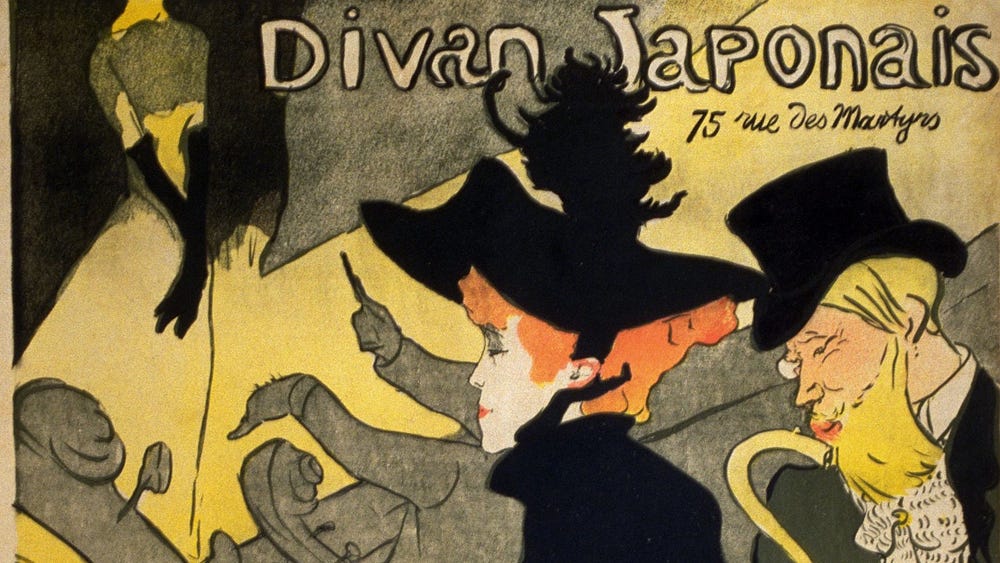Japanesque: The Japanese Print in the Era of Impressionism
Feb 1, 2010
Henri de Toulouse-Lautrec Divan Japonais, 1893. Color Lithograph Poster With Crayon, Brush, Spatter, And Transferred Screen, 31 7/16 x 24 3/8 in. (79.9 x 61.9 cm). Bruno and Sadie Adriani Collection, 1958.88
San Francisco, California, February 2010—The Japanese Print in the Era of Impressionism at the Legion of Honor introduces audiences to the development of the Japanese print over two centuries (1700–1900) and reveals its profound influence on Western art during the era of Impressionism. This exhibition, on view October 16, 2010, to January 9, 2011, complements the de Young Museum’s presentations of paintings from the Musée d’Orsay, many of which are aesthetically indebted to concepts of Japanese art. Culled primarily from the holdings of the Achenbach Foundation for Graphic Arts, the exhibition of approximately 250 prints, drawings, and artists’ books unfolds in three sections: Evolution, Essence, and Influence.
Evolution
Evolution presents a chronological development of the Japanese print in Edo (present-day Tokyo), beginning with early black-and-white woodcuts and handcolored woodcuts. They are followed by delicate three- and four-color prints by early masters of ukiyo-e such as Suzuki Harunobu and Kitagawa Utamaro that feature the courtesans and beauties of the “floating world.” Landscape prints from the 1830s by Katsushika Hokusai and Andō Hiroshige are shown as examples of that important Japanese genre.
Essence
The Essence section features the Japanese aesthetic in print, and particularly highlights those subjects and compositional concepts that Western artists admired and imitated. Iconic images such as Hokusai’s The Great Wave and Fuji above the Lightning from the series 36 Views of Mount Fuji (1831–1834) are shown here, as well as Hiroshige’s Plum Orchard from his famous series One Hundred Famous Views of Edo (1857).
Influence
A large group of works by European and American artists of the Impressionist and Post-Impressionist eras who were influenced by the Japanese print includes prints and drawings by Mary Cassatt, Edgar Degas, Edouard Manet, Henri de Toulouse-Lautrec, Vincent van Gogh, and James Abbott McNeill Whistler. The artists collected Japanese prints and often produced their own graphic work that, in composition, color, and imagery borrowed directly from the Japanese aesthetic. Henri Rivière’s homage to Hokusai Thirty-Six Views of the Eiffel Tower (1902) is featured, as well as the work of American artists such as Arthur Wesley Dow and Helen Hyde, who traveled to Japan to enhance their knowledge of the Japanese color woodcut.
Artist Studio featuring the Craft of the Color Woodcut
Color woodcut techniques developed by the Japanese and adopted by Western artists are featured in a special education gallery within the exhibition. The “artist studio” includes woodblocks, tools, preparatory drawings, and progressive color prints that demonstrate the process of designing, carving, and printing color woodcuts.
Catalogue
Exhibition curator Karin Breuer has written an insightful, fully illustrated catalogue that includes 100 images from the exhibition (paperback 144 pages, $22.95). The catalogue is available in the special exhibition Museum Store. Also available is a stunning recreation of Henri Rivière’s 1902 volume Thirty-Six Views of the Eiffel Tower with an afterword by James Ganz and Karin Breuer (hardback 105 pages, $22.95).
Organization
Japanesque: The Japanese Print in the Era of Impressionism is organized by the Fine Arts Museums of San Francisco under the curatorial direction of Karin Breuer, curator-in-charge of the Achenbach Foundation for Graphic Arts. The lead sponsor is Union Bank and additional support is provided by the Achenbach Graphic Arts Council, The Brown Foundation, Inc., Andy and Carrick McLaughlin, and Emily Huggins Fine.
Visiting \ Legion of Honor
The Legion of Honor is celebrating Japanesque with a special exhibition store and a French bistro menu in the Café, including brunch on Saturday and Sunday, and weekend afternoon organ concerts.
The Legion of Honor displays a collection spanning more than 4,000 years of ancient and European art and houses the Achenbach Foundation for Graphic Arts in a neoclassical building overlooking Lincoln Park and the Golden Gate Bridge.
Lincoln Park, 34th Avenue and Clement Street, San Francisco, CA 94121
Hours:
Tuesday–Sunday, 9:30 am–5:15 pm; closed on Monday.
Admission:
$10 adults; $7 seniors; $6 youths 13–17 and students with college I.D. Members and children 12 and under are free. General admission is free the first Tuesday of every month.
Group Sales:
For adult groups of 10 or more contact groupsales@famsf.org.
